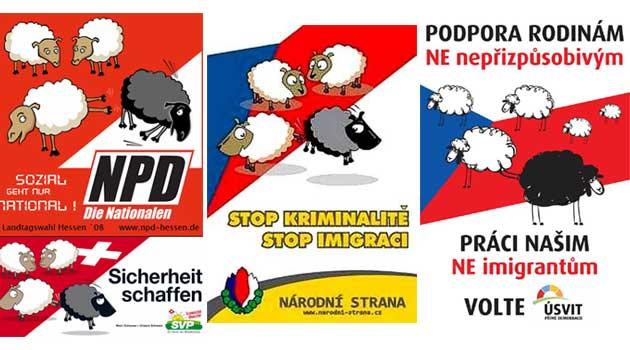Deutsche Bank study says Czech Úsvit the equivalent of Greek, Hungarian neo-Nazis

News server Euractiv reports that a Deutsche Bank (DB) study published at the end of March says a wide variety of eurosceptic parties could hold as many as 204 of the European Parliament’s 751 seats after the upcoming elections. Interestingly, its analysts include the left-wing Communist Party of Bohemia and Moravia among the hardcore eurosceptics.
DB says that right-wing eurosceptics in the Czech Republic include the Party of Free Citizens (Svobodní) and the Dawn of Direct Democracy (Úsvit), which takes a sharp stand against the EU. The study associates Svobodní with the UK Independence Party (UKIP) and the National Front in France, while it categorizes Úsvit as of the same ilk as the neo-Nazi Golden Dawn party in Greece or Jobbik, a Fascist party in Hungary.
The analysts observe that the eurosceptic landscape in the EU is very diverse. The rise of completely new parties with this agenda, such as the Alternative for Germany (AfD), are said to be an exception.
"Usually this concerns parties, whether on the left or the right, that were exploiting nationalist themes prior to the euro crisis. They did not begin to criticize the EU and its policy until the crisis," the study says.
DB is counting on three possible scenarios of voter success for such groups. At the most these parties might win 27 % of the vote and 204 seats, in the middle variant they would win 22 % of the vote and 167 seats, and a lower outcome for them would be 17 % of the vote and 129 MEPs.
"Even under the extreme supposition that the eurosceptic parties might mobilize a large number of their potential voters and overall voter participation might be low, they would not attain a eurosceptic majority that is capable of functioning," the analysis says. However, the more moderate right-wing oriented sections of such parties might manage to combine forces and establish their own group in the EP.
All that is needed to do so is 24 MEPs from at least seven countries. The DB study reminds readers that because of these elections, national governments may be influenced by eurosceptic parties at home and may insist more on support for their national interests.
The eurosceptic agenda will therefore probably have an indirect impact and influence both before and after the EP elections, DB believes. The bank has primarily noticed that similar themes can influence economic and monetary union, the work of the European Central Bank, and financial transfers between eurozone countries.
According to the DB analysis, moderate eurosceptics reject only some aspects of EU integration and the current institutional form of the EU. Hardcore eurosceptic parties are completely against integration and aim to remove their countries from the EU.
The right wing usually discusses fears of losing national identity, restrictions on sovereignty, and institutions in Brussels having too much influence, as they believe the EU to be an abstract, expensive, out-of-control project. The DB analysis notes that the right therefore usually mentions the difference between "us" (the citizens) and "them" (the EU bureaucrats who are elected by no one).
The DB study says left-wing euroscepticism criticizes EU integration as a project of globalization and neo-liberalism in which a single market primarily harms labor and social conditions. The left is also bothered by a lack of supervision of the financial markets, and any eventually-promoted savings measures are perceived as an effort to undermine social solidarity, the study says.
DB currently considers 56 MEPs in the European Conservatives and Reformists Group, which includes the ODS party of the Czech Republic, and 35 MEPs in the Europe of Freedom and Democracy Group to be eurosceptic to various degrees. The bank says another 35 MEPs who are independents and not members of any group have also backed partially eurosceptic opinions.